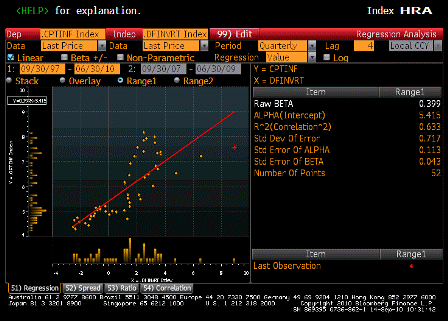The latest mortgage foreclosure mess is just another financial crisis.
It’s not a real economic crisis- no houses have been actually destroyed- no fire, hurricane, or earthquake damage, etc.
So the responses aren’t about bulldozers, hammers, concrete pouring, etc.
The question is whether this financial discovery/event spills over into the real economy.
The question is, are the authorities standing by with policy responses as needed to make sure people can still go to work to grow food and eat it, build houses and live in them, make shoes and wear them, go to hospitals and take care of sick people, go to schools and teach classes, maintain the infrastructure, do cancer research, etc. etc. etc?
Of course not. And therefore it all might again needlessly/tragically spill over to the real sector.
Just like in August 2008, we might again let a financial crisis spill over into the real economy and make today’s still very bad economy even worse.
As I said then, yes, it’s critically important to identify and punish the bad guys with a vengeance, alter incentives that support fraud, etc. etc. etc.
And it’s even more important to not let the financial crisis spill over into the real economy by letting aggregate demand fall, sales collapse, and jobs get lost.
And now, as then, interest rate cuts and just about anything else the Fed might do aren’t going to do the trick, and, then as now, will probably just make it worse.
Now, as then, as always, an immediate fiscal adjustment IS the silver bullet that restores demand.
Now, as then, a full payroll tax (FICA) suspension will immediately work to restore private sector aggregate demand, sales, and jobs. For the most part, private sector jobs are a function of sales, directly or indirectly. Capitalism is driven by sales. Businesses large and small compete for consumer dollars. But here has to be consumer dollars to compete for.
Public infrastructure spending works as well, but takes a while, so the answer is to do both. Suspend FICA taxes and put in place desired infrastructure project funding, presumably in a well thought out basis with an eye to efficiency, and not in a blind rush to support aggregate demand.
So why is our government not standing by to suspend FICA taxes?
Why haven’t they already done it?
Especially as It’s a highly regressive punishing tax on the people we need most and the people who are hurting the most- the people actually working for a living who produce all the real goods and services that support our existence.
Yes, it’s the first deadly innocent fraud at work- government thinks it needs those FICA revenues to be able to make Social Security payments.
Our Federal government officials do not understand the function of federal taxes is to regulate the economy, and not to raise revenue.
The don’t understand the function of federal taxes is to take dollars away from us, and not to give them what they need to spend.
Their first clue should be that if we were to pay our taxes with old $20 bills they’d give us a receipt and then shred them. But it isn’t.
(And removing what’s restricting aggregate demand is not getting something for nothing.)
Instead, the deficit terrorists are firmly in control.
The best we can expect is for them not to raise taxes at year end when the tax cuts expire. There is no talk of lowering taxes, under any circumstances.
Even from the media’s ‘deficit doves’ who remain THE problem, agreeing that the ‘long term deficits’ is a problem, pointing to interest rates as evidence markets currently are willing to fund deficit spending, and talking about how austerity now is not the way to bring down deficits longer term- in general, flagrantly violating ‘Lerner’s Law’ and conceding the principle to the deficit hawks.
So will this latest mortgage crisis hurt the real economy?
Probably not, best I can tell. Looks more to me like it’s a potential transfer of dollars from banks and lenders with no propensity to spend to borrowers with high propensity to spend.
But I could easily be wrong. There is the risk that events could result in a further cutback in credit to the real economy.
And while this potential drop in aggregate demand is easily offset by a simple fiscal response, the odds our current gaggle of regulators and elected officials getting it right with an appropriate fiscal response seem slim and none.



